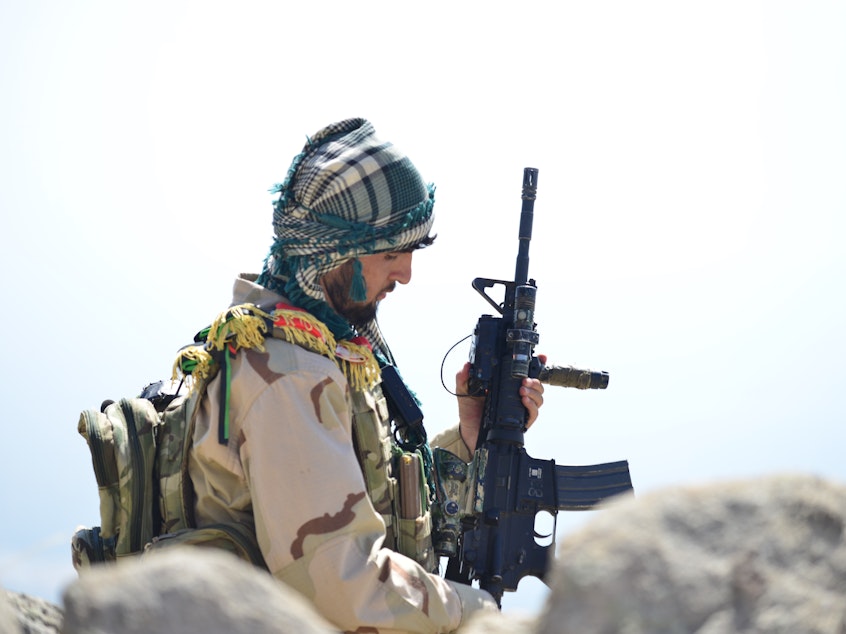The Afghan Resistance Says Reports Of Its Defeat In Panjshir Are Taliban Propaganda

A band of Afghan resistance fighters holed up in Afghanistan's rugged Panjshir province northeast of Kabul has repelled repeated attacks by Taliban fighters in recent days, a representative for the group tells NPR.
Speaking with NPR's All Things Considered on Friday, Ali Nazary, the National Resistance Front's head of foreign relations, who is currently in the U.S., also denied reports that the Taliban have taken control of the province — the last major territory standing between the Islamist militia and total control over Afghanistan — calling the rumors "propaganda."
The Panjshir Valley "has not been breached," he told host Audie Cornish. "The Taliban are facing fierce resistance."
"The Taliban propaganda machine is trying to divert attention, is trying to spread propaganda, to weaken morale in Kabul and elsewhere," said Nazary, who says he has been in close contact with NRF officials in Panjshir.
Nazary's remarks came on a day that saw both the Taliban and the NRF claiming victories and denying defeats. In sharp contrast to Nazary's comments, there were reports of "celebratory gunfire" in Kabul, the Afghan capital, over the Taliban's purported victory in Panjshir.
Sponsored
The NRF, which says it has about 10,000 fighters, is made up of various local militias and former Afghan security force members. It is led by the Western-educated son of legendary mujahedeen commander Ahmad Shah Massoud, who was assassinated in the days leading up to the 9/11 terrorist attacks. The elder Massoud famously helped fight both the Soviet army and the Taliban to a standstill from his stronghold in the Panjshir Valley, situated in the Hindu Kush mountains.
Joining Massoud's opposition is Amrullah Saleh, who was vice president under President Ashraf Ghani, who fled Afghanistan as the Taliban closed in on the capital last month. In a video posted to social media, Saleh also denied rumors of a defeat.
Countering reports that he and Massoud had also fled, the former vice president told his supporters that he is in the Panjshir Valley and that the NRF has "held ground" and will continue to fight.
Nazary said that the Taliban launched their latest — and largest-to-date — offensive in hopes of conquering Panjshir before announcing a new government.
"Fortunately, our forces bravely fought them. They repelled all of their attacks," he said, adding that the Taliban had even retreated from some areas.
Sponsored
Panjshir has been described as a natural fortress against invaders, but it isn't clear how long the resistance can hold out against a larger and better-equipped Taliban force.
Nazary said that elements of al-Qaida have joined the Taliban and that the resistance is fighting them "all alone."
"The whole world has abandoned us," he said. "We're not receiving any type of assistance, whatever form it could be. And we're fighting al-Qaida and international terrorism at the moment. And everyone is ignoring this."
Although the resistance continues to fight, Nazary said, it maintains "lines of communication" with the Taliban and has made a so-far-unsuccessful call for a say in the new government.
"The Taliban movement does not represent the vast majority of Afghanistan's population. The vast majority are against them," he said. "In order for them to form an inclusive government, they have to include all ethnic groups, all political forces, all political parties from throughout the country, both women and men."
Sponsored
"Unfortunately, right now in their government that they're forming, they're ignoring 50 percent of the society, which are women," Nazary said. [Copyright 2021 NPR]
